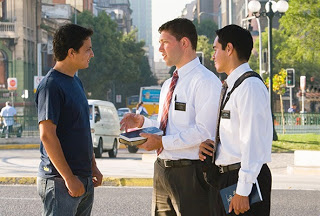 |
| Missionaries (lds.org) |
We all know how difficult it is to prepare teenagers to go on missions. Some are more ready than others. In many cases, missionaries encounter questions in the field they’ve never been asked before.
Often their own Mission President doesn’t want them to answer or even discuss these questions.
Now of course the missionaries are not “defenseless” in the broad sense of the term. They have the Lord with them. They are protected, as we all know, and the Spirit guides and directs them, touches the hearts of the people they meet, etc. But they are defenseless when it comes to answering and even discussing some of the most common questions they get from investigators and former Mormons.
And instead of being defenseless, they could be using these questions to bring people to Christ.
More and more I’m hearing from people afflicted with Mesomania that the geography doesn’t matter. “People either get a spiritual testimony of the Book of Mormon or they don’t,” the reasoning goes, “and geography has nothing to do with it.”
In fact, that’s sort of the rationale for the disastrous BYU “abstract” video-game map that puts the Book of Mormon into a fantasy setting. At BYU now, the setting for the Book of Mormon is wherever you want it to be, so long as you can pull and stretch it from an interpretation driven by Mesomania.
Proponents of these theories will increasingly claim that the geography doesn’t matter because that’s the easiest way for them to minimize their cognitive dissonance, but that approach is exactly what is causing missionaries so much trouble.
Despite their natural curiosity, some people don’t care about the setting. They accept the divine authenticity of the Book of Mormon on its face. They don’t even want to think about the geography issue lest it raise questions that don’t have answers.
This is basic psychology, and it’s true of adherents to every religion and nonreligion. On my first mission, I met Catholics every day who said they had their religion and they didn’t want to know about mine, even when they didn’t know what their church taught or didn’t believe it when they did.
Most people resist ideas that might cause them to change. That’s what makes missionary work difficult. (Google “people resist change” to see explanations for why people resist change.)
Lots of LDS people–maybe the majority of active LDS–are also in this category.
This is why BYU’s “abstract” map works. It’s easy and familiar to students raised on video game fantasy worlds. Apparently most students don’t know or care about the implications of thinking of the Book of Mormon in a fictional setting that teaches Joseph and Oliver were mistaken.
_________________
Resistance to change is a wall. It keeps most people safely inside the traditions they grew up within and protects them from outside challenges and threats. Only a few members of a community climb the wall and venture outside. Some return, but others are never seen again.
Every person a missionary meets is surrounded by such a wall of varying height. The wall is built of bricks such as inertia, uncertainty, loss of control, defensiveness, peer pressure, etc.
Christian ministers recognize the threat of Mormonism. The wall between traditional Christianity and Mormonism is lower because of common beliefs in the Bible and in Christ.
For that reason, anyone who attends a Christian church has probably been told to ask Mormon missionaries these questions. I’ve seen it in their ministry materials. I’ve been with the missionaries when these questions were asked, and I’ve had them tell me about other times when people ask these questions.
“Where did the Book of Mormon take place?”
4. Mesoamerica (if they’ve been educated by the Conclave).
5. Wherever you want it to be, aka Fantasyland (if they’ve been educated at BYU recently).
I’m told that in many areas, they have been instructed to drop investigators who pursue this line of questioning.
Eliminating investigators who have these questions serves only to restrict the pool of potential converts. Apparently, that’s a risk many Mission Presidents are willing to take because they, themselves, can’t answer the questions and they want to protect the missionaries from entertaining these questions when investigators pose them.
_____________________
*(Recap: If you still believe in the Mesoamerican, “two-Cumorahs” setting, you are taking the position that (i) Joseph and Oliver were ignorant speculators who misled the Church about the location of Cumorah, (ii) we should trust modern LDS scholars and educators more than Joseph and all of his contemporaries and successors, and (iii) we can’t even rely on General Conference talks when they contradict what our LDS scholars and educators are teaching now.)
**Collectively, I’ve labeled these the “citation cartel” in the past. I’ve agreed to stop calling them this if they can provide another term for the collective, but so far they haven’t. I don’t want to call them the Borg. I don’t know a non-pejorative term for Groupthink, but if anyone has one, I’d be happy to use it instead. For now, I’ll call them the “Conclave.”
Source: Book of Mormon Wars
